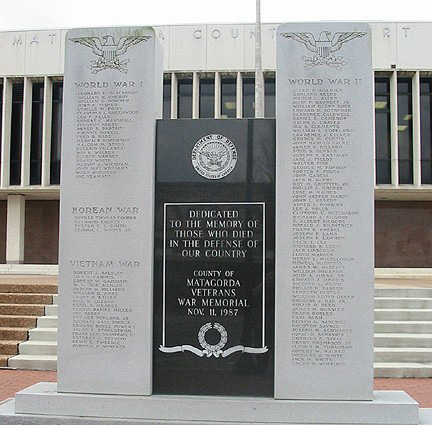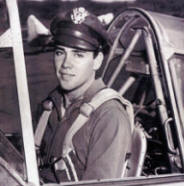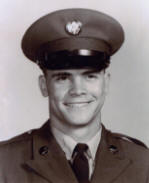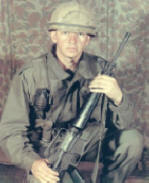|
|
MATAGORDA COUNTY WAR
MEMORIAL
|
|
|
|
The idea for a county war memorial was
presented by Mr. Vernon Miles of VFW Post
2438 sometime in 1985 or 1986. After
further consideration a committee, The
Promoters of Patriotism, was formed to
spearhead a monument project, with Mr. Lamar
Evans serving as the chairman of the
committee.
Using US Government lists of casualties,
newspaper articles and input from the
community, a list of names for the memorial
was slowly developed by the committee during
their many working sessions.
Mr. Ronnie L.
Miller of Taylor Bros. Funeral Home, and Mr.
Walter Lamar Evans, Sr., co-owner of the
Walker-Evans Landscape Maintenance Co., and
owner of the Gold Coast Nursery, Inc.,
worked on the basic design of the memorial;
they used a photograph of a similar monument
found in the trade journal Elberton
Graniteer as a reference. Mr. William
"Bill" M. Hilton drew an artist's rendition
of the design that was used for both a
brochure about the memorial and the
dedication program.
This was ushered in following the
publication on July 16, 1981 of a letter to
the editor decrying the lack of American
flags on display on July Fourth [in Bay
City]; the letter was from Mr. Dixon Brown
of San Antonio, Texas.
A war memorial brochure was provided to the
community explaining that a fitting and
lasting memorial was being planned to
reverently remember all those from Matagorda
County who made the supreme sacrifice of
giving their lives in World War I, World War
II, and the Korean and Vietnam Conflicts.
It went on to say that the cost of the
memorial would be $27,000.00, and that help
was needed to make it a reality.
Through public donations from the citizens
of the community, civic organizations, local
businesses, and the large plants in the
county, a total of $29,000.00 was
successfully raised.
The 15 ton, 12 foot tall gray and black
granite monument was crafted in Elberton,
Georgia by the Standard Granite Company,
with installation on the north side of the
courthouse being completed shortly before
the dedication.
With great fanfare, the beautiful memorial
was dedicated on Veteran’s Day, November 11,
1967.
With the advent of the availability of the
computer, and all the resources it provides,
it has been determined that a few errors did
occur during the process of determining
whose name would be placed on the monument.
This is not to detract from the efforts that
were made by the The Promoters of Patriotism
committee, which used every resource that
was available at the time. They are to be
highly commended, for this beautiful
memorial is a testament to their painstaking
work and the many hours they committed to
the project.
|
|
|
BAY CITY AMERICAN
LEGION POST NO. 11 MEMORIAL
|
|

|
In 2006 Bay City American Legion Post
No. 11 dedicated a monument to service members who had
made the highest sacrifice on the Altar of Freedom. The
monument is located on their front lawn at
2106
Cottonwood Street, Bay City, Texas. |
 |
|
BAY CITY MEMORIAL STADIUM
|
|
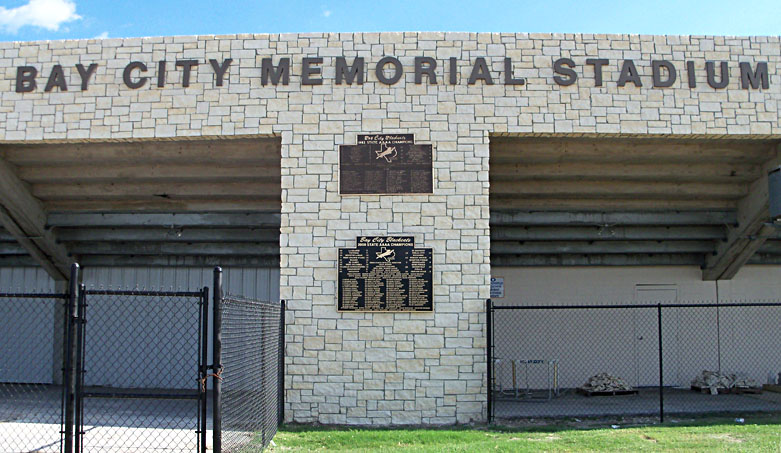
Designed by Bert
Charles Steves
Bay City Memorial
Stadium
Mr. Lewis M.
Matchett, local mortician and Secretary of the Bay City Lions Club,
originated the idea of building a new football stadium for the high
school. In presenting the proposal to the club it was pointed out
such a project was to be undertaken with the cooperation of the
Rotary Club, Chamber of Commerce, Junior Chamber of Commerce, the
American Legion and Veterans of Foreign Wars. All of the
organizations unanimously approved the construction.
The Lions Club
donated $5,000 to get the project started. The Bay City Gas Company
also donated $5,000; this was followed by local sports fans,
citizens of the community, local businesses and civic organizations
contributing another $5,000. The School Board issued Revenue
Bearing Bonds for $50,000 which made it possible to then erect the
stadium. No tax dollars were used in the construction. The stadium
was to be situated on a part of 27 acres of land the Bay City
Independent School District had purchased from Alexander D. and
Margaret “Maggie” Hensley on March 21st, 1941 in the
northeast section of the city. The new stadium was to be dedicated
to Matagorda County’s veterans of World War I and II and was to be
named Memorial Stadium. A memorial plaque commemorating these
servicemen was to be placed at the entrance to the stadium. This
plaque is missing today (2012).
The school board
received five bids to construct the stadium in August 1947. All five
were rejected as being too high. In another round of bids in
October of 1947 three bids were received and P.E. Garrett
Construction Company of Bay City was accepted as the low bidder,
their bid being $51,346. The construction consisted of twin
concrete and steel bleachers with a capacity to seat 4,000 people
and restroom facilities. The stadium was constructed with an easy
incline, and an unobstructed view was available from any seat.
Noteworthy and highlighted in several of the newspaper articles
concerning the construction of the stadium were the field lights.
They were to be mounted on 80 foot poles behind the bleachers so no
one’s view of the field would be obstructed. Several articles
bragged they were the best that could be bought and they were said
to be twice as bright as the lights on the old football field, and
that the field would be one of the best lighted in Texas.
The stadium,
after the original dedication date was rained out, was dedicated on
the evening of September 24, 1948 during the halftime with an
impressive ceremony. Reverend Luke Bolin, a former Army Chaplain
during WWII gave the dedication address. In closing his remarks
he stated “This stadium
is being dedicated to all those of this community who served in
either World War I or World War II or both. - “In honor of the men
who played football for Bay City High School and who fought in
either or both World Wars – we dedicate this stadium! – “In honor of
all veterans of both wars in this community – We dedicate this
stadium! – “In memory of all who gave their lives in the Great Wars
– We dedicate this stadium!”
It had been thirty-five years since
the first war memorial had been erected in Matagorda County. That
memorial was dedicated on the courthouse square in 1913, to the men
of Matagorda County, who had served in the Civil War. There were no
memorials for those who had served in World War I or World War II.
The dedication of the Memorial Stadium served to fill that need, and
is recognized as the second major war memorial in the county.
That first football game in the
stadium was between the Bay City Black Cats and the Edna Cowboys
before a crowd of approximately 3,000 people. The Black Cats
were victorious, winning the game 13 to 6.

Memorial Stadium Dedication
Newspaper Articles
|
PAYNE-WICKHAM
AMERICAN LEGION POST
|
|
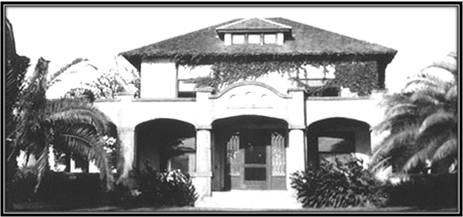
Holsworth Home
|
Private First Class Marvin Arthur
Wickham
Payne-Wickham Post Newspaper
Articles |
|
Little is known of the Payne-Wickham American Legion
Post. It was discovered by accident while doing research
on the Palacios American Legion Post. Some information
can be pieced together from newspaper articles published
in 1928 in The Daily Tribune and the Palacios
Beacon, and from the federal censuses for Matagorda
County. From these articles it was found the new pastor
of the Collegeport Presbyterian Church, Reverend
Merriman L. Smith (1894-1991), who had been an Army
Chaplain during WWI, and had been wounded, initiated the
organization of an American Legion post in Collegeport.
The post was established around May 1928, and was named
the Payne-Wickham Post No. ___. Most posts are usually
named after servicemen from the local community who have
died in war. It is presumed Wickham would be PFC
Marvin A. Wickham, US Army who died in France during
WWI. His family was living in the Palacios, Texas area
when he died. The Payne name requires more speculation,
as there is no serviceman known by that name from
Matagorda County who died in WWI. Researching the Payne
name in Matagorda County immediately prior to WWI it was
found there was a Joseph “Joe” E. Payne, age 13, living
with his family on the Blessing Road near Palacios. Joe
was born in Virginia, and his father, also named Joseph,
died in 1900. By 1910 his mother,
Rosemary Eveline aka Mary E,
had re-married to a
William H. Brown, and the children appear to have
intermittently used both the Brown and Payne surnames.
He did serve in WWI, and it appears while he was in the
service, his family moved to Harris County, Texas. In
as much as he returned to his family (surname Brown) in
Harris County after the war, speculation arose in the
Collegeport area that he had been killed in the
service. This was not disproved until August 1937 when
his brother Waller [William?] was visiting with Mr.
Harry Austin Clapp, Collegeport’s author of “Thoughts”,
an amusing newspaper column concerning daily happenings
in the local area. He stated Joe was alive, well,
married and had twin boys. It has not been determined
if the post ever had a permanent home. The first
meetings were held at the home of the Commander, Mr.
Mason Standish “Jack” Holsworth (1894-1959), who had
served in the Army during WWI. Other meetings are known
to have been held at Oscar Chapin’s barber shop. It is
not known when the post closed. As of this writing (Sep
2012) the Texas American Legion Headquarters in Austin,
Texas is doing research on the post, but nothing has
been found to date.
|
|
CLARENCE GREENWOOD AMERICAN LEGION POST NO. 476
GREENWOOD-CURTIS AMERICAN LEGION POST NO. 476
|
|
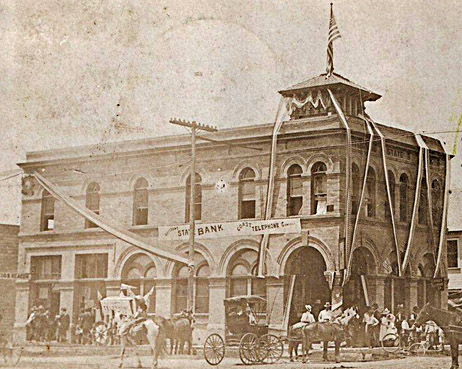
|
On July 20, 1928 the Clarence Greenwood American
Legion Post No. 476 was chartered in
Palacios, Texas. It was named in honor of
PVT Clarence Greenwood, USA, who
was killed in action in France during WWI.
After WWII, the post was renamed to include
CPL George M. Curtis, USAAF, who was
missing after the Bataan Death March in the
Philippines. It was learned he had died as a
Japanese POW. PVT Greenwood is buried at the
San Antonio National Cemetery, San Antonio,
Texas. CPL Curtis is buried at the Manila
National Cemetery, Manila, Philippines. When
the Greenwood American Legion post was first
organized in 1928 they held their meetings
upstairs in the Palacios State Bank. The
post is no longer active, and no photograph
has been found of the post home which was
destroyed by Hurricane Carla in 1961. |
 |
|
|
American-Legion Post Organized At Palacios
At a meeting held in Col. Dallas J.
Matthews quarters at Division Headquarters, Friday, July
20, the newly organized post of the American Legion was
duly organized and the officers installed by Captain
Ernest C. Cox, Assistant State Adjutant.
The Post shall be known as Greenwood
Post in Honor and as a tribute to Clarence Greenwood,
son of J. D. Greenwood, who was killed in the recent
World War.
Many speakers of prominence both in
the Legion and National Guard were present, a few of
those present were Brigadier General George P. Rains, 42nd
Brigade; Col. Holman Taylor, 144th Infantry;
Lt. Col. Dallas J. Mathews, Assist. Chief of Staff, 36th
Division; Lewis Lauterstein, State Membership Chairman,
San Antonio; Ernest Cox, Asst. State Adjutant, Austin,
Texas.
The officers elected for the coming
year are L. S. Appleton, Post Commander; Claude Allen,
Vice Commander; Wm. Clement, Jr., Adjutant; Wallace
McDougal, Treas.; George Hunter, Sgt. At Arms; Wm. A.
Elder, Historian; J. A. Derrick, Chaplain.
Palacios Beacon, July 26, 1928
|
|
PHILIP H. PARKER POST 2438 VETERANS OF FOREIGN WARS
|
|
In 1948 Bay City
VFW Post 2438, chartered on November 24, 1940, changed
its name to Philip H. Parker VFW Post 2438 in honor of
Capt. Philip H. Parker, USAAF, who was killed in action
in China on March 23, 1945. Captain Parker was buried
with full military honors at Cedarvale Cemetery, Bay
City, Texas. The post is still active in the community.
Historical Marker Dedication
|
|

|
 |
|





